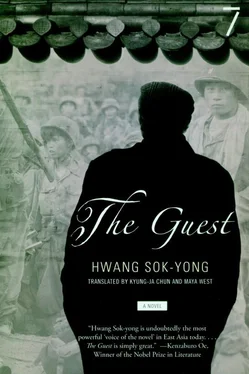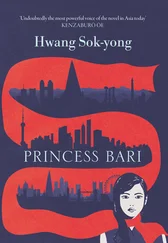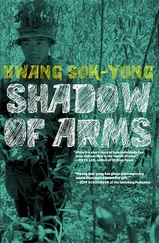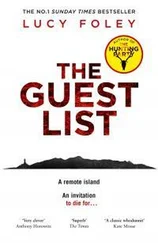“Good heavens, man, if you’re drunk just go on home and take a nap. An old man should have a sense of shame!”
As the party secretary grumbled and turned away from the director, All Back asked the director, “Are the two of you friends from the same hometown, sir?”
“We’re more than just friends — we’ve been through everything together, ever since we were children. We know why they call man the most evil creature in the world, don’t we?”
Shooting the director a sidelong look of disapproval in lieu of a response, the party secretary walked out of his office. Suddenly, the director of the museum turned to Yosŏp and implored, “This year I turned seventy years old — not a day less! To have survived this long, it’s a miracle, don’t you think? All these people here now, but less than two in ten are really from here, you know?”
“There was a lot of shifting after the war,” retorted the guide halfheartedly.
But the old man was getting worked up now.
“They were punished by Heaven, you see, ’cause they did it to each other. All the rice paddies and vegetable fields, they were all completely ruined, choked with weeds like some sort of haunted house.”
Trying to help the director understand the situation, All Back said indirectly, “This is the Reverend’s hometown, as well.”
As the guide’s words sank in, the director staggered up from his seat, glaring at Yosŏp.
“And you’re a minister? You believe in Jesus?”
With that, the old man cleared his throat and spat on the floor. Stalking out, he added, “I don’t drink with big-nosed bastards!”
* * *
There are always witnesses.
The female guide returned and informed All Back that all necessary preparations were complete. The latter stood up and asked Reverend Ryu Yosŏp to come to the reception room. Without an inkling as to what was going on, Yosŏp did as he was told. The room was spacious, with sofas lined up along the walls and a long, low table in front of each seat. The center of the room was empty except for a silk carpet embroidered with magnolias. Judging from the white screen that hung on the right wall, the space must have been designed to hold different kinds of meetings. Already in the room, sitting across from the screen, were a man, four women, and the party secretary. As Yosŏp walked in, they all got up and applauded. The female guide introduced them.
“The comrades here are all survivors who witnessed the tragic events we were discussing earlier. They are gathered here today to share the full truth with you.”
At first the “witnesses” seemed a bit nervous; they all began their stories rather cautiously. As they went on, however, their anger and sorrow gradually increased and, as if possessed, their voices grew louder — some even shed tears. Still, Yosŏp knew only too well that their testimonials were all fabrications. He himself had been there, in that same place at that same time. True, the tragic events themselves had probably taken place. A nightmare is real, but how light, how colorless the words that must be used to convey it after one wakes up! Words that had been repeated hundreds, even thousands of times, over and over again — they fluttered in the air, distorted and charred like the pages of a burnt book. Their original typeface, the messages they were once meant to convey, had long since turned to ash.
Their words flitted past, like short sentences typed out on a keyboard, typing away Yosŏp’s past and future. They all said “the American troops,” but Yosŏp knew for a fact that the troops had simply been passing through. They were never stationed in Sinch’ŏn; they were in a rush to get further north. Both Yosŏp and his brother Yohan knew for a fact that during those forty-five days, before the arrival of the U.S. troops and after their departure, most of the military strength in the area had consisted of the security forces and the Youth Corps — all Korean.

Kim Myŏngja. Currently employed in sales at Pyongyang Department Store. Eight years old at time of incident. First-grade student at local elementary school. Father was supervisor of People’s Military Committee. Father was tortured, covered in gasoline, and set ablaze. Wriggling and twitching, he howled like a beast, flopped to the ground, and was consumed by the flames like a piece of cloth. Myŏngja was one of six children. Missed chance to retreat north due to road blockage. Family members left behind in village were taken to enemy campsite, where large bonfire was burning. Drunken, they beat her mother and tore off her clothes. Calling the children “red brats,” they picked them at random and threw them into the fire. Mothers who tried to jump in the fire to save their children were shot. For one week Myŏngja was locked in a warehouse designated for children. They were given no water. The younger children cried from hunger. The infants’ cries soon grew weak. It was December, dark and cold. The children were so starved that roundworms in their stomachs crawled up into their mouths. The famished children chewed them up. Mothers, ready to face the last, screamed for water. The enemy brought buckets filled with sewer water. The children’s tongues ripped and bled from licking the spilt water with their tongues. Mothers fed children with urine they’d collected. American soldiers came and checked the girls’ faces with flashlights, shouting, “Sexy, sexy.” Big Sister was dragged away. A female teacher from the elementary school was dragged away. They did not return. Harrison decided mothers and children would enjoy being together. He gave orders to separate them and let them die of worry, crying for each other. Mothers and children were torn apart and locked up in different warehouses. Children cried, crawling around on the concrete floor, asking for mothers. Their knees and elbows were scraped, bleeding. Children continued to cry for water. Guards brought bucketfuls of gasoline. Laughed as children dipped their shoes in gasoline and drank out of them, writhing in pain afterwards. Set inside of warehouse on fire. Children who did not burn died of suffocation. Many children died by the air shaft when the monsters threw in grenades. That night, climbing on top of the children gathered by the wall, Myŏngja got up and out of the air shaft, made a narrow escape, and survived.

Chu Ch’angwŏn. Currently a farmworker. Brought up as orphan. Five years old at time of incident. Shoved his face into a palm-sized hole in the wall. Miraculously rescued but crippled from grenade splinters.

Ch’oe Kyŏngnyo. They stripped her mother naked and dragged her around by a wire they pierced through her nose because her husband was in the army.

Oh Ŭnsun. Ten years old at time of incident. Currently employed as guide at the Sinch’ŏn Museum, exposing imperialist America’s crimes to the world. Father was Party member. Also member of Mount Kuwŏl guerrillas. Family was unable to retreat. Family went to mountain in search of father. Mother was caught while foraging in village for food. Ŭnsun was locked up in landlord’s storage house. Unexpectedly ran into her father. Reunion between father and daughter was not allowed. Father was tortured in front of small daughter. Daughter fainted. They buried the father alive in a dugout. Ŭnsun crawled out. Approximately twenty of Ŭnsun’s close relatives were killed.

Читать дальше

















